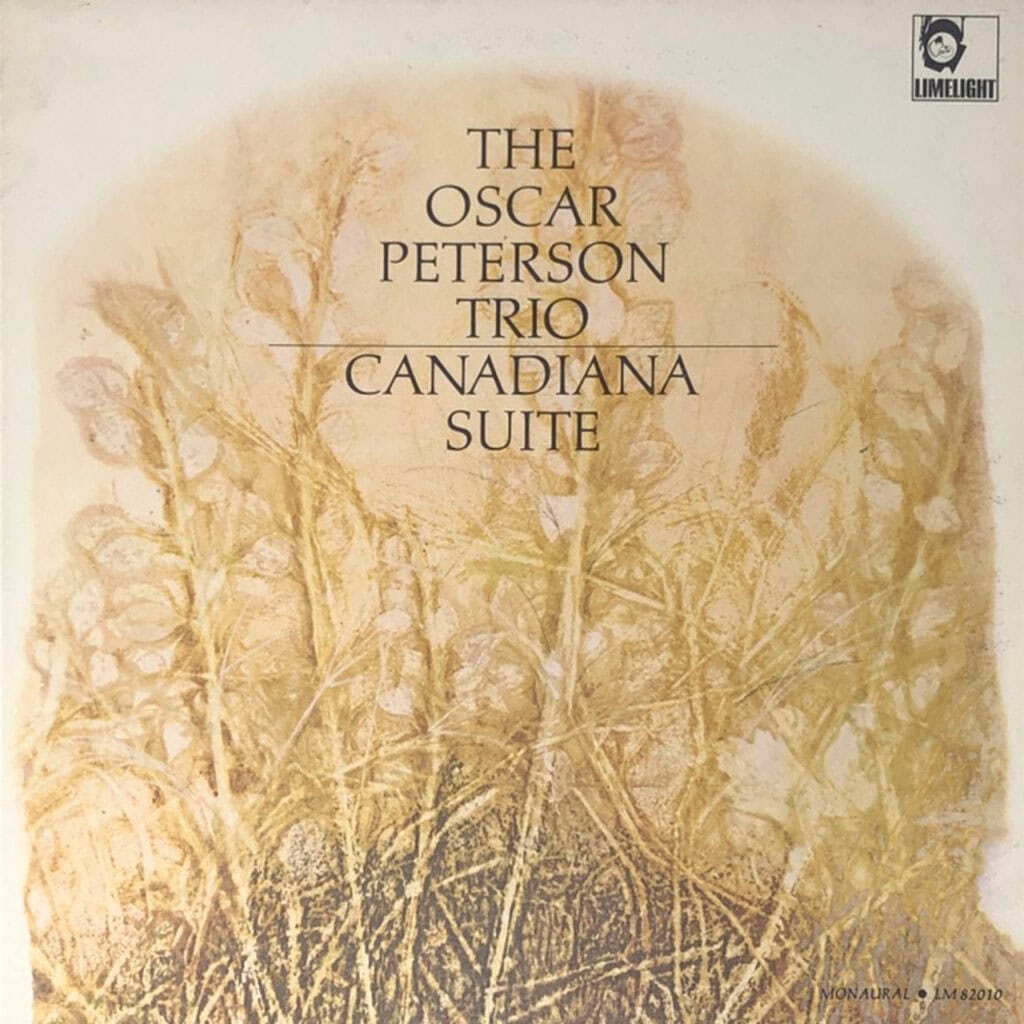When it comes to mastery of an instrument — and specifically jazz piano — Oscar Peterson had few equals. Duke Ellington once called the Canadian pianist the “maharajah of the keyboards,” and the moniker stuck.
Born in Montreal, Peterson never moved away from Canada, but he was revered worldwide. He won eight Grammys, including a Lifetime Achievement Award, was the first artist to be inducted into the Canadian Music Hall of Fame, and he’s a member of Canada’s Walk of Fame, and the International Jazz Hall of Fame.
By the mid-1960s, Peterson had already established himself as one of the 20th century jazz greats. But, as Canadiana Suite shows, the world had yet to glimpse his full talents. In jazz parlance, a “suite” is akin to a symphony or a concept record in rock — and this eight-song album stands among Peterson’s most ambitious works.
Released 60 years ago in 1965, Canadiana Suite earned a Grammy nomination for Best Original Jazz Composition of that year, and was later inducted into the Canadian Songwriters Hall of Fame in 2008.
Peterson first performed the Canadiana Suite in the summer of 1964 on a special episode of CBC’s Wayne and Shuster Hour.
The concept behind this record was simple: showcase the beauty and uniqueness of Canada in song — one composition at a time. Canadiana Suite takes listeners on a journey from sea to sea, starting in Atlantic Canada (“Ballad to the East”) and continuing to the West Coast (“Land of the Misty Giants”). Whistle stops occur in between — in the place of his birth (“Place St. Henri,” an ode to the Montreal neighbourhood where Peterson grew up) and in the Prairies (“Wheatland”).
Each composition paints a portrait of the pastoral landscapes Peterson observed in his train travels and captures the spirit of this great country. The musician described this suite as a “musical portrait of the Canada I love.”
To mark the album’s milestone anniversary — and to coincide with centennial celebrations honouring Peterson — Amplify examines this classic through the ears of award-winning jazz cats Andy Milne and Bill King, who share their insights into why the pianist’s patriotic ode to Canada’s pastoral landscapes still resonates six decades later.
On August 16, 2025, a day after what would have been Peterson’s 100th birthday, Andy Milne honoured the jazz giant at Studio Bell, home of the National Music Centre, with a concert and intimate conversation about the artist’s cultural importance. Catching up with the two-time JUNO Award-winning composer in Ann Arbor, Michigan one month later, Milne shares a few reasons why Canadiana Suite matters.

Amplify: Do you recall the first time you heard Canadiana Suite or when you first became aware of this album?
Andy Milne: « Oscar had a lot of threads for me to cling to long before I became one of his students at York University. He had a series of Etude books and in my collection I have the score for Canadiana Suite. I don’t know when I would have got this score, but it was probably in that period of my life when I was really ingesting his music.
« Before the tribute I did on Oscar’s birthday at the National Music Centre, I revisited a lot of his music. That caused me to do a lot of deep reflection on the social subtext around this recording in particular, but also around his life and his place in the musical community internationally at large. This was a much different perspective than I would have been able to appreciate as a 10-or-14-year-old kid listening to this record for the first time. »
Amplify: In revisiting this record and re-examining Canadiana Suite from a more mature lens, what stuck out for you?
AM: « The thing that really stuck with me in re-examining this particular suite of music is that there’s eight pieces, and half of them are very blues-based. I’ve never heard people talk about this before, but personally I think there’s a subtle middle finger pointed by Oscar south of the border in a very dignified kind of way. He was sort of taking a stance and claiming legitimacy in this genre of music.
« Canadians have their own burden to carry culturally — always comparing themselves to our neighbours to the south — and it was even more extreme in Peterson’s time, certainly as a Black Canadian. So, by playing music born out of an African-American experience, I believe there’s something to the fact that half of this suite is so blues-based because truthfully the blues are not part of the fabric of Canadian culture like it is in the United States.
« The fact that his father was a [railroad] porter, there is sort of a rail journey nature to the Canadiana Suite, but it’s not necessarily presented in a continuous line. I don’t know if it’s an homage to his father — since it’s a journey his dad took many times — as much as it is an homage to the country he loved and his take on its distinctive nature. To me, more than a train journey, the album represents the natural beauty and topography of Canada and its landscapes. For the tribute concert that I curated for the National Music Centre, the pieces from the suite I played were: ‘Laurentide Waltz,’ ‘Place St. Henri,’ ‘Hogtown Blues,’ and ‘Blues of the Prairies.’ I skipped the edges, and I’m not sure why, but I gravitated towards those particular pieces. »
Amplify: Any final thoughts on any other pieces or Canadiana Suite as a whole?
AM: « Sometimes I feel that this suite could have been written for a ballet because there’s a certain sort of physicality to some of the compositions, especially a piece like ‘March Past.' »

Bill King is a classically-trained pianist who has garnered three JUNO nominations, served as the musical director for Janis Joplin, and toured with the Pointer Sisters during the course of his professional career that spans 64 years. Born in Jeffersonville, Indiana, King won a scholarship to study with Oscar Peterson’s Advanced School of Contemporary Music when he was just 17 years old.
Amplify: When you listen back to Canadiana Suite today, what stands out to you about the trio’s chemistry and the way Peterson captured Canada in sound?
Bill King: « The Canadiana Suite wasn’t just another record — it was Oscar Peterson’s love letter to the land that raised him, stitched together by the swing of Ray Brown and the finesse of Ed Thigpen. That trio — 1959 through ’65 — was the dream unit, the Cadillac of piano trios. If you grew up spinning their records, you knew this was the sound: the trio in full bloom, cracking like a whip on the up-tempo numbers and purring like a big cat when the ballads rolled in. Later, Peterson favoured the guitar line — Herb Ellis, Barney Kessel, Joe Pass—but for a brief stretch, it was three against the world.
« What makes Canadiana Suite timeless to me isn’t just the patriotic conceit — it’s the fact that two of its movements leapt from the page and settled into the jazz canon. ‘Place St. Henri’ is no walk in the park — it’s a runaway train down the Metro line. Montreal grit and stride. The trio tears through it like they’re chasing daylight, Brown snapping the strings, Thigpen dropping bombs, Oscar’s right hand darting like a prizefighter. Fingers poppin,’ joy a-boppin’ — an impossible little showpiece that still startles. Then comes ‘Wheatland.’ Sun-splashed, horizon-wide, the sound of optimism rolling off the prairies. Few pianists could summon that kind of light with such clean articulation and muscular drive.
« Peterson owned the eighty-eights the way Ellington owned the orchestra. And when I once asked him, in all my green naïveté, if the trio rehearsed, he just smiled and said, ‘On the bandstand.’ That was the secret — the spontaneity, the risk, the trust. You hear it in every bar of Canadiana Suite: three men, one voice, Canada laid out in jazz time. »

Album: Canadiana Suite
Released: 1965
Label: Limelight
Track List:
- Land of the Misty Giants
- Ballad to the East
- Laurentide Waltz
- Place St. Henri
- Hogtown Blues
- Blues of the Prairies
- Wheatland
- March Past
As part of centennial celebrations honouring Oscar Peterson’s legacy, the National Music Centre’s exhibition Timeless: 100 Years of Oscar Peterson opened this year at Studio Bell in Calgary and continues until July 2026.